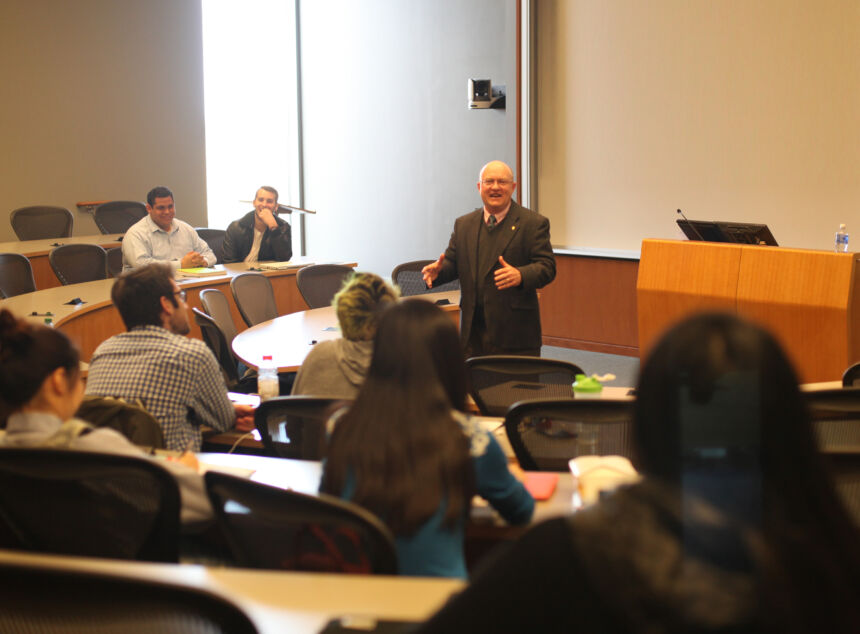March 26, 2015
Former Secretary of State Colin Powell’s chief of staff talks candidly about strategic intelligence

Penn State School of International Affairs students got an inside look at the strategic build-up to the Iraq war when Ret. Colonel Lawrence Wilkerson visited the school on March 18th to discuss his career and experience with a group of students. The retired Army colonel and chief of staff to former Secretary of State Colin Powell came to SIA as part of Professor Dennis Jett’s Spring Colloquium on Current Policy Challenges (INTAF 590) and told the story of his involvement in preparing a United Nations presentation for Powell in 2003 to convince the U.N. Security Council about Iraq’s weapons of mass destruction and a connection between al-Qaida and Iraq.
“I was part of possibly the biggest strategic disaster the U.S. has perpetrated in this generation,” he said. “It’s also one of my biggest regrets.”
Wilkerson was responsible for the assembly of the intelligence for the presentation Powell gave on February 5, 2003 to the U.N. Security Council. The intelligence was provided by the Director of Central Intelligence, George Tenet. Wilkerson attributes his failure to realize that the evidence given to him and the Secretary was faulty to the limited time (only one week) that he had to review the data and the orchestration of that intelligence by the Vice President, Richard Cheney.
After recounting his experience and explaining how the CIA manufactured evidence that allowed U.S. politicians to sanction attacking Iraq, Wilkerson reminded students that this was not a new development, listing other examples of misused or manufactured intelligence in U.S. relations with Vietnam, Chile, Guatemala, and Lebanon.
“This wasn’t the first time that cherry-picked intelligence was wrapped around policy,” he said. “However, arguably, the Iraq war is the most disastrous, and we have yet to see the full ramifications of this disaster.”
He quickly finished telling his story, and then opened the floor for questions. Students wanted to know how Wilkerson would repair the damage done by the Iraq war.
Wilkerson presented a three-part solution: bringing into government moral, educated people, particulary in intelligence positions; electing moral, educated people to Congress; and establishing a new political party to begin to offset the political paralysis in Washington.
Students also asked about how to prevent the use of faulty intelligence to manipulate policy. They wanted to know why the Congressional Intelligence Committees didn’t do more. Why didn’t they go through the information more carefully? The discussion continued for 45 minutes, touching on the topics of U.S. relations with Iran and the possibility of an agreement between Israel and Palestine.
“To have access to speak with the most important people close to a secretary of state is an amazing opportunity,” said SIA student Simon Jean Francois. “He had firsthand experience with one of the most important historical events of our time.”
“I never thought I’d be able to talk with the chief of staff for a secretary of state,” said Matt Hobbs, another SIA student. “It’s such a unique experience.”
Jett organizes the semester-long colloquium to bring thought leaders on topics ranging from food security to terrorism. The program features 14 speakers and the topics vary depending on the current issues of the day.
